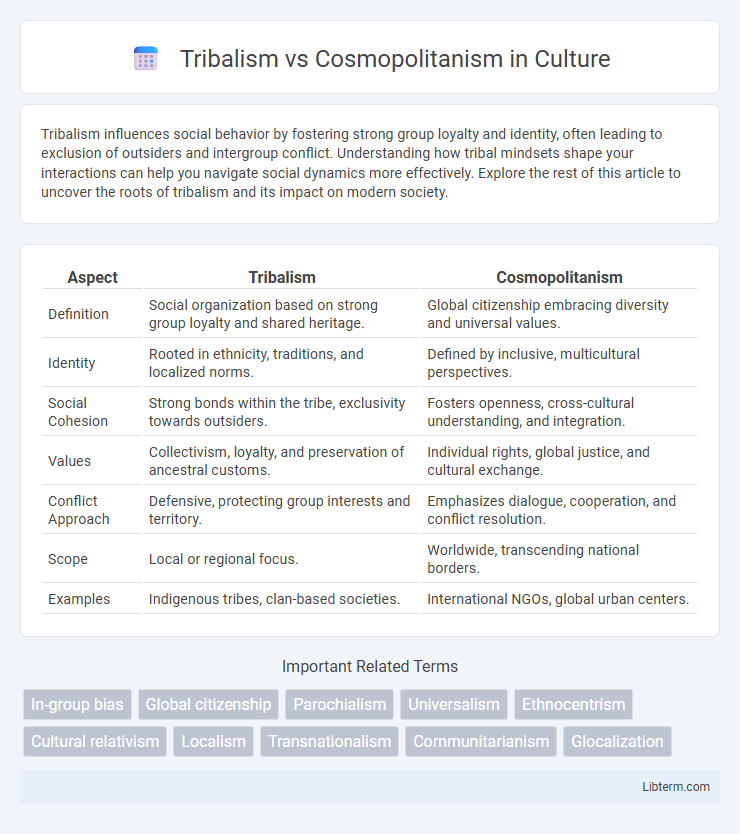Tribalism influences social behavior by fostering strong group loyalty and identity, often leading to exclusion of outsiders and intergroup conflict. Understanding how tribal mindsets shape your interactions can help you navigate social dynamics more effectively. Explore the rest of this article to uncover the roots of tribalism and its impact on modern society.
Table of Comparison
| Aspect | Tribalism | Cosmopolitanism |
|---|---|---|
| Definition | Social organization based on strong group loyalty and shared heritage. | Global citizenship embracing diversity and universal values. |
| Identity | Rooted in ethnicity, traditions, and localized norms. | Defined by inclusive, multicultural perspectives. |
| Social Cohesion | Strong bonds within the tribe, exclusivity towards outsiders. | Fosters openness, cross-cultural understanding, and integration. |
| Values | Collectivism, loyalty, and preservation of ancestral customs. | Individual rights, global justice, and cultural exchange. |
| Conflict Approach | Defensive, protecting group interests and territory. | Emphasizes dialogue, cooperation, and conflict resolution. |
| Scope | Local or regional focus. | Worldwide, transcending national borders. |
| Examples | Indigenous tribes, clan-based societies. | International NGOs, global urban centers. |
Understanding Tribalism: Definition and Core Principles
Tribalism refers to a strong loyalty to one's own group, characterized by shared customs, beliefs, and a collective identity that distinguishes members from outsiders. It often emphasizes in-group cohesion, social conformity, and defense against perceived external threats. Core principles include loyalty, solidarity, and prioritizing group interests over individual autonomy or broader societal concerns.
The Rise of Cosmopolitanism in a Globalized World
Cosmopolitanism has surged as global interconnectedness intensifies, emphasizing shared human values over ethnic or national identities. Advances in technology, international trade, and migration facilitate cross-cultural exchange, fostering inclusive worldviews that challenge tribal exclusivity. This shift promotes cooperation on global issues like climate change and human rights, reshaping political and social dynamics worldwide.
Historical Roots of Tribalism and Cosmopolitanism
Tribalism finds its roots in early human societies structured around kinship, shared ancestry, and local group loyalty, which ensured survival and social cohesion. Cosmopolitanism emerges from ancient trade networks, philosophical traditions like Stoicism, and the expansion of empires such as the Roman Empire, promoting universal citizenship and cultural exchange. The contrast between tribalism's inward focus and cosmopolitanism's outward inclusivity reflects foundational historical dynamics shaping social identities and political organization.
Social Identity: Us vs. Them
Tribalism emphasizes strong group loyalty and social identity by defining clear boundaries between "us" and "them," fostering in-group solidarity but often leading to exclusion and prejudice against outsiders. Cosmopolitanism promotes a more inclusive identity that transcends local or ethnic affiliations, encouraging individuals to embrace global citizenship and diversity. This shift in social identity from tribal exclusivity to cosmopolitan inclusiveness can reduce intergroup conflict and support cooperative coexistence.
Local Loyalty vs. Global Citizenship
Local loyalty in tribalism emphasizes strong emotional and cultural bonds within a specific community, fostering identity, trust, and mutual support among members. Cosmopolitanism advocates for global citizenship, promoting universal values, cross-cultural understanding, and responsibilities beyond local or national borders. The tension between these paradigms reflects competing priorities between preserving localized heritage and embracing global interconnectedness for shared human progress.
Tribalism’s Role in Community and Belonging
Tribalism fosters strong community bonds by promoting shared identity, cultural heritage, and mutual support within groups. This sense of belonging enhances social cohesion and collective resilience, enabling individuals to feel secure and valued. Tribal affiliations often fulfill fundamental human needs for connection and recognition, reinforcing solidarity and cooperation.
Cosmopolitanism and Cultural Diversity
Cosmopolitanism promotes embracing cultural diversity as a foundation for global citizenship and mutual respect among different ethnic groups. It encourages openness to multiple cultural perspectives, fostering inclusive societies where diverse traditions, languages, and beliefs coexist harmoniously. This worldview supports cultural exchange and integration, enhancing cross-cultural understanding and cooperation in an interconnected world.
Political Implications: Division or Unity?
Tribalism fosters political fragmentation by prioritizing in-group loyalty and identity, often leading to exclusionary policies and heightened conflicts within societies. In contrast, cosmopolitanism promotes political unity through global citizenship ideals, encouraging inclusive governance and cooperation across diverse cultural and national boundaries. The tension between tribalism and cosmopolitanism significantly shapes policy debates on integration, multiculturalism, and national sovereignty.
Challenges and Criticisms of Both Perspectives
Tribalism faces challenges such as promoting exclusivity, resistance to diversity, and fostering conflict through strong in-group loyalty that marginalizes outsiders. Cosmopolitanism is criticized for overlooking local identities, appearing elitist, and struggling to implement universal values in culturally diverse societies. Both perspectives encounter difficulties in balancing communal cohesion with broader inclusivity, often leading to tensions between local allegiance and global responsibility.
Finding Balance: Towards an Inclusive Future
Finding balance between tribalism and cosmopolitanism requires embracing cultural diversity while fostering shared global values that promote cooperation and mutual respect. Inclusive futures depend on recognizing tribal identities without allowing them to fuel exclusion or conflict, enabling societies to harness the strengths of both local solidarity and global interconnectedness. Policies that encourage dialogue, equitable resource distribution, and intercultural education play vital roles in bridging divides and cultivating unity amid diversity.
Tribalism Infographic

 libterm.com
libterm.com